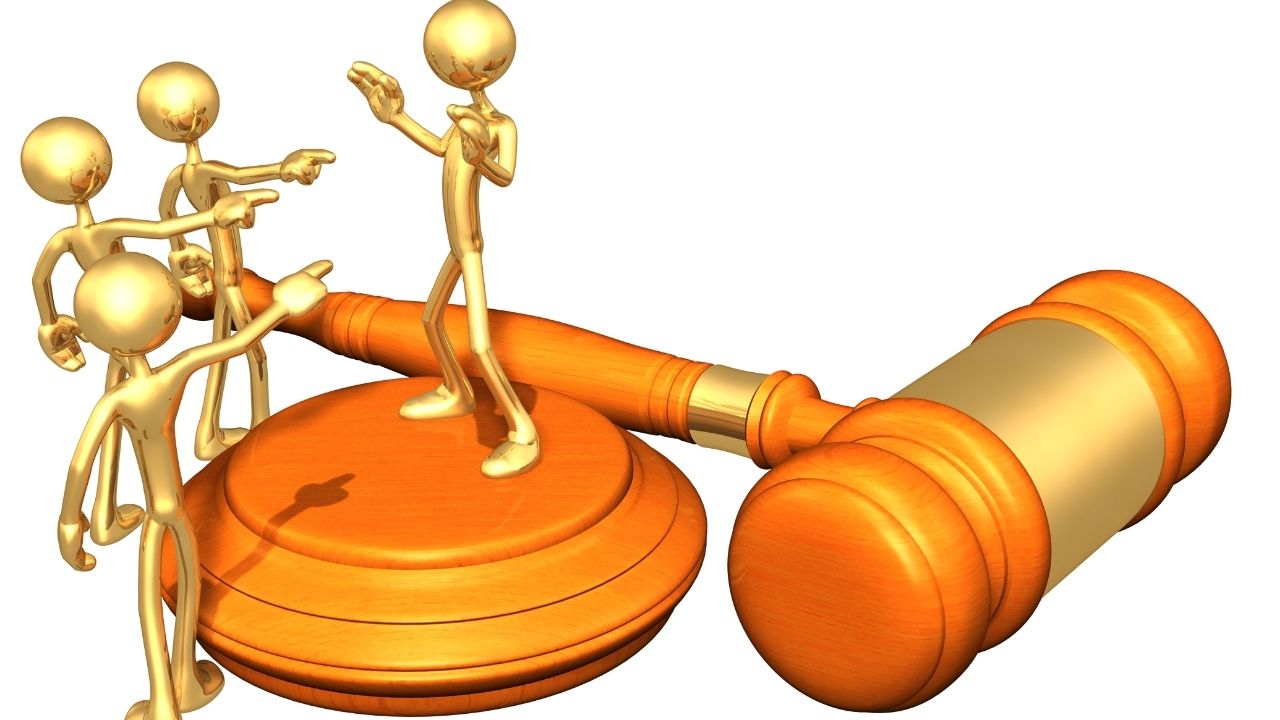Lifestyle
What Should You Do If You’re Falsely Accused of a Crime?

Being falsely accused of a crime can feel terrible – and put you in danger of losing your freedom over something you didn’t do. There are many ways this can happen. A vindictive coworker might imply that you committed some form of criminal negligence. A stranger can claim you assaulted them. Or a police officer might pull you over for some traffic violation you didn’t commit.
In any case, there are a set of steps that can help you clear your name and navigate the complexities of the legal system.
Remain Calm, Patient, and Compliant
If you know you’re being falsely accused, you may feel stressed, threatened, and uncertain about your future. In these circumstances, it’s easy to allow your emotions to get the better of you and make a reckless choice.
However, it’s important to remain as calm, patient, and compliant as possible. If you’re calm, you’ll be able to think through your situation rationally and come to more logical decisions. If you’re patient, you’ll be able to deal with the weeks-long waits you may have to face as you navigate the legal system. And if you’re compliant with police officers, you’ll face fewer complexities – and eliminate the possibility of additional charges like resisting arrest.
Stay Silent When Possible
For the most part, it’s not a good idea to talk to the police about the crime by yourself. Police officers aren’t your friends, no matter what they may tell you. They’re not looking out for your best interests, and it’s completely legal for them to lie to you.
During your arrest and subsequent interrogations, officers will likely ask you questions and prod you to get as much information as possible. If you say anything even remotely self-incriminating, they can pick up on that and use it against you. Even if you’re innocent, your words may accidentally serve as a confession to the crime – or you may commit to another crime unknowingly. On top of that, if you’re answering lots of questions back to back, you’ll run the risk of contradicting your own story – which is not a good look.
It’s well within your rights to avoid answering questions until your lawyer shows up. It’s the safe move to stay quiet.
Hire a Lawyer as Soon as Possible
If you’re accused of something you didn’t do, it’s important to hire a lawyer as soon as you can. Your lawyer will be a professional familiar with the legal system, so they can guide you to make the smart decisions and defend yourself to the best of your ability. They’ll have your best interests in mind, so you can talk to them openly and devise a strategy together.
Your lawyer may advise you to handle police questioning in a certain way or make a certain plea. They can help observe the arrest process to ensure it’s done within the boundaries of the law. And of course, they can fight for you in court if the case ever gets that far.
Without a lawyer, you’ll have no external authoritative guidance to help you prepare a case and defend yourself. You may be more likely to incriminate yourself, and your chances of escaping impending charges will be much lower.
Gather Your Own Evidence
Your lawyer may also advise you to start gathering your own set of evidence you can use to defend yourself, such as:
- Photos. Are there photos that prove the extent of the damages or show that you weren’t in a certain place at a certain time?
- Videos. Do you have any recorded videos of what happened? What about surveillance footage and other videos from third parties?
- Receipts, writings, and timestamps. Can you find things like receipts, text messages, emails, or other documents with timestamps that prove things that occurred or didn’t occur?
- Witnesses. Do you have any witnesses who saw the situation unfold? Are there people who can testify about your whereabouts or even your character?
Defamation and Malicious Prosecution
If you’ve been cleared of a crime and you believe the accuser was specifically trying to harm your character, you may have a defamation lawsuit on your hand. These cases can be tricky since you’ll need to prove libel or slander, but if you’re successful, you can win damages from your false accuser to compensate you for your expenses and suffering along the way.
Being falsely accused of a crime can be demeaning, stressful, and downright frightening at times. But as long as you remain quiet and cooperative, and you hire a good lawyer, you’ll have a good chance of defending yourself successfully and proving your innocence.
Stay patient and trust that your legal strategy will prove the truth in court.
Lifestyle
The Breakroom Reset: Small Changes That Improve the Workday

The office breakroom is a space that’s often neglected and can sometimes feel more like an afterthought than a key feature of the workplace. This is unfortunate, especially since employees typically visit the breakroom to rest and recuperate before finishing their shift. Considering its intended function, the breakroom should be viewed as one of the most important spaces in the entire office.
Having a welcoming and rejuvenating breakroom can promote social interaction, enhance workplace culture, and reduce stress. Employees who feel restored after visiting the breakroom are more likely to feel happy at work and be more productive the rest of the day. If your workplace breakroom leaves a lot to be desired, here are some small changes you can make to totally reset it.
Small Breakroom Changes That Improve the Workday
Unless your breakroom is in shambles and needs major reconstruction, you don’t have to spend a fortune on it to make it more inviting. In many cases, small and simple changes can make a big impact on the overall vibe of any space.
Whether you’re working with a limited budget or limited space, there are still plenty of things you can do to reset your boring breakroom. Here are some small breakroom changes that can improve the workday and give you maximum bang for your buck.
Convenient Hydration Options
Employees need to stay hydrated to keep their health and energy levels high. Unfortunately, many employees are chronically dehydrated because they don’t have access to tasty beverages at work. This doesn’t necessarily mean you have to install a soda machine in the breakroom. Giving workers unlimited access to sugary drinks could backfire in the long run by contributing to illnesses and increased sick days.
Instead of offering sugary beverages (that can actually contribute to dehydration in the long run), make it easier for your employees to stay hydrated with pure water. Providing a filtered office drinking water system is one of the best ways to encourage optimal hydration. Most employees will appreciate the clean, tasty alternative to standard office tap water.
Comfy Seating
When was the last time you took a look at the seating arrangements in your breakroom? If it’s been a while, take a walk over there and give it a good look. Is there sufficient space for multiple employees to sit at the same time? Are the seats comfortable and rearrangeable so employees can interact with others or achieve greater privacy as desired? If not, you might benefit from a breakroom seating reset.
Seating arrangements in breakrooms should be both comfortable and flexible. You might want to bring in some modular furniture because it’s easy to move and rearrange as needed. For maximum versatility, seating arrangements should include a mix of traditional breakroom chairs and tables, lounge chairs, and even bean bags. Making the space as open as possible will also help it look more roomy and inviting.
Nutritious Snack Options
Most employers don’t provide full meals for their employees. It’s perfectly reasonable to expect workers to make their own lunch or dinner arrangements. However, if you want to support your employees’ energy levels, keep healthy snacks in your breakroom. Nutritious snacks can enhance employee performance throughout the day, so workers find it easier to get more done.
Instead of investing in chips, candy bars, and other sugary sweets, opt for snack options that won’t cause sugar spikes and inevitable crashes. Some great options include trail mixes, protein bars, fresh fruit, popcorn, and veggie trays. Instant oatmeal cups can also be a convenient source of energy for those who don’t have time to grab breakfast before heading to work. You might want to send out an employee survey to see what types of healthy snacks your workers prefer.
Optimal Lighting
Did you know that poor lighting can negatively impact your employees’ psychological and emotional well-being? Improving workplace lighting (including in the breakroom) can make a huge difference in worker morale and energy levels. Warm white light may be a great choice for the breakroom because it creates a soothing, calm atmosphere. Cool white light might be a better fit for conference rooms and cubicle areas because it enhances focus and energy.
Of course, natural light is arguably the best option for the office whenever it’s available. If your breakroom has windows, try to keep the shades open during working hours. That way, employees can experience the mood- and health-boosting benefits of natural light exposure.
Entertainment Options
Some office managers and CEOs mistakenly think that a breakroom should be boring to serve its purpose well. However, the terms “boring” and “relaxing” are not synonymous. Employees may find a boring breakroom to be surprisingly non-restorative. On the flip side, a room equipped for entertainment can be very relaxing and rejuvenating.
To make your breakroom a more enjoyable place to spend time, you might want to install a corner television. That way, workers can watch their favorite sitcom while they relax. You might also keep a few card or board games stocked in a cupboard for employees who prefer to interact in fun ways during their lunch breaks.
Reset Your Breakroom Today
Your employee breakroom can reveal a lot about your overall workplace environment. If it’s not lit well, or if it’s boring and unwelcoming, workers are more likely to feel underappreciated and discontented. The good news is that you don’t have to sink a lot of money or effort into resetting your breakroom and getting a fresh start. Use these simple tips to revamp your breakroom and make it a place where workers can go to feel truly cared for and relaxed.
-

 Tech5 years ago
Tech5 years agoEffuel Reviews (2021) – Effuel ECO OBD2 Saves Fuel, and Reduce Gas Cost? Effuel Customer Reviews
-

 Tech6 years ago
Tech6 years agoBosch Power Tools India Launches ‘Cordless Matlab Bosch’ Campaign to Demonstrate the Power of Cordless
-

 Lifestyle7 years ago
Lifestyle7 years agoCatholic Cases App brings Church’s Moral Teachings to Androids and iPhones
-

 Lifestyle5 years ago
Lifestyle5 years agoEast Side Hype x Billionaire Boys Club. Hottest New Streetwear Releases in Utah.
-

 Tech7 years ago
Tech7 years agoCloud Buyers & Investors to Profit in the Future
-

 Lifestyle5 years ago
Lifestyle5 years agoThe Midas of Cosmetic Dermatology: Dr. Simon Ourian
-

 Health7 years ago
Health7 years agoCBDistillery Review: Is it a scam?
-

 Entertainment7 years ago
Entertainment7 years agoAvengers Endgame now Available on 123Movies for Download & Streaming for Free
